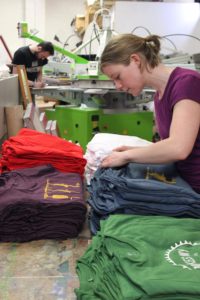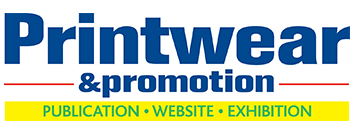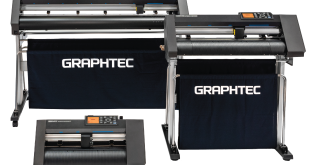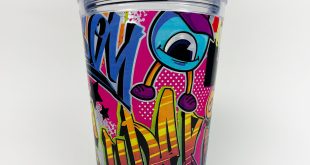The 100% sustainable dream began in 2006 for Get A Grip Studio and now more than a decade later the dream has become reality. P&P editor Melanie Attlesey reports.

Sam Foggan, director of Get A Grip Studio, began to head down the sustainability route in 2006 when, unhappy with some water-based screen printing he had commissioned for his sustainable skiwear brand, he started Eco Merch, an environmentally-friendly screen printer based in Birmingham.
In the first two years of the business, Sam sought out the lowest impact inks, emulsions and chemicals available to him. He refused to use stencil strip, instead opting to use water baths, vibration and a lot of blasting with a pressure washer to clean his screens. And to create the prints he used an Antec Legend manual screen printing carousel with 100% water-based inks on solely sustainable clothing, enabling the company to offer an environmentally-friendly, more affordable screen printing service.
Get A Grip Studio was formed in 2009 after a merger with another company and in 2014 Sam’s partner Lucy Perkins joined the business.
11 years later
More than a decade after Sam started his sustainable dream, Get A Grip Studio is doing pretty much the same thing, but on a much larger scale. Every inch of the business oozes an eco-friendly and environmentally-friendly vibe. The only difference with today’s business is the help of an eight-arm Roq You automatic carousel, which has served the company well over the last four years.

Earlier this year Get A Grip Studio became GOTS (Global Organic Textile Standard) accredited. This means that the company can finally offer its printing service as organic certified. Lucy explains: “The standards are very rigorous, but were relatively straight forward for us to achieve as we have always printed using the most environmentally-friendly materials and methods we can, as well as using renewable energy, minimising our water usage and recycling everything we can to reduce waste. None of our waste goes to landfill.”
The journey to becoming GOTS accredited was not plain sailing. For a period of time Get A Grip Studio was forced to offer conventional garments in order to stay afloat. “It appeared we were perhaps slightly ahead of the times in offering wholly sustainable screen printing on a commercial scale; organic garments cost too much to make them a viable business option for the majority of start-up brands and bands, our customer base at the same,” says Lucy. “Although we subsidised the organic garments we provided, during those years we printed conventional cotton garments with a little disappointment in ourselves and our business so we are pretty thrilled to be financially stable enough to switch back to a 100% sustainable offering.”
Would Lucy recommend this way of operating a business to others? Absolutely she says. “However, it’s not the easy route; water-based inks are often more expensive and generally harder to work with, profit margins may perhaps not be as high and so on. So although some may be considering doing it to ride the green wave, it’s not necessarily an immediate money spinner.”
As well as becoming GOTS accredited, the company plans to become carbon neutral by the end of the year. Currently all of the company’s waste is carbon neutral and its courier service is also carbon neutral. In a previous premises, Get A Grip Studio used 100% renewable energy, however in its new premises in Stirchley, Birmingham this wasn’t an option as it does not have a mains gas supply to it. Instead the company pays into a scheme to offset the gas used.
Lucy says: “It’s brilliant being able to make changes to each area of the business to make it more sustainable, more environmentally sound and ultimately a healthier, more enjoyable place to work. There is, and has always been, a DIY element to the business. Sam is pretty hands on with a bit of an engineer’s brain, so where possible improvements and adjustments are made by him. He’s always dreaming up new products and ideas, some of which come into fruition, others are waiting for a bit more free time.”
Not your average
Get A Grip Studio is certainly not your average print shop, and aside from being GOTS accredited the business focuses on keeping its environmental impact as low as possible. “Using MagnaColours 100% water-based inks has never been a marketing angle for us, or a way of keeping more eco-conscious customers happy,” says Lucy. “It’s the only way we can morally run our business.” She continues by stating that in today’s marketplace there is a wealth of choice for those looking for a more socially and environmentally better option and as a result they are pleased to be able to offer their customers a wide range of garments, all of which are sustainable.
The garments predominantly used by Get A Grip Studio are sourced from Stanley & Stella and Continental Clothing’s Earthpositive range. Lucy explains that the reason behind this is that Continental Clothing has offered sustainable garments for years and offers the benefit of a 90% lower carbon footprint, while Stanley & Stella is a newer company it boasts an extremely wide range of styles and colours all of which are sustainable.
As honourable as it may be to run an environmentally-friendly business, is it worth the effort if the consumer doesn’t appreciate the work undertaken and the end product?
“I think people possibly are becoming more aware of the manufacturing process and conditions, and certainly when these conditions are brought to the fore through media, the public’s behaviour may change,” says Lucy.

She continues: “However, price and consequently profit is very much still key for the majority. Back in 2006-8 we spent quite a lot of time explaining to customers what organic cotton was, and why it was important to support that industry. Now, the vast majority know what the difference is, and if they are not particularly concerned about the environmental and health benefits of cotton growers and industry workers, the choice comes down to quality vs value. If you think that the difference in price between a standard promotional cotton tee and our retail quality 100% organic cotton tee is 60p, would adding 60p to the retail price (maintaining the same profit) really deter any would-be customers? Or would the superior quality, fit, print finish, and ethical and environmental implications actually improve your customer’s opinions of your brand, band or business?”
Going off grid
This is a question every screen printer should be asking themselves. Offering retail quality products and helping the environment clearly complement each other rather fittingly. And as everyone knows our planet and the people that inhabit it need looking after.
Summing up her and her partner’s obvious passion Lucy says: “As far as we are aware, no other commercial screen printer in the UK currently offers what we do, along with an ink system that is entirely 100% water-based and formaldehyde-free. All backed up by our in-depth knowledge of water-based inks from over a decade of exclusive use of them.”
What does the future have in store for Get A Grip Studio as it continues down the sustainability avenue? Lucy says: “In five years time we hope to be in new, purpose built studios, producing our own 100% renewable energy, solar panels on the roof, a ground source heat pump and much more besides. Taking our studio off-grid if we can.” She also jokes: “We also hope to have enough employees to allow us to have weekends off regularly too!”
 Printwear & Promotion The Total Promotional Package
Printwear & Promotion The Total Promotional Package




